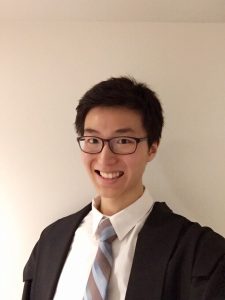Kevin is a full-time student pursing 1-year MSc in Applied Linguistics for Second Language Aquisition. He graduated from his BA (Honours) degree in English Language and Literature with First Class Honours at Newcastle University before coming to the department to undertake his Master’s degree.
What degree did you apply for and why was it important to you to study this?
I applied for the MSc degree in Applied Linguistics and Second Language Acquisition. As a CELTA-qualified teacher, I feel compelled to understand how the classroom second language (L2) teaching contributes to and influences students’ development of the L2. My research interests include L2 teaching and learning, sociocultural theories, classroom interaction, content and language integrated learning and L2 teacher education.
What’s your plan for once you graduate?
I will be pursuing a PhD in Language Education after my MSc degree. As a language teacher, I am only able to influence at most a few hundred students. Becoming an academic provides me the opportunity to contribute to the entire language education sector. Completing a doctorate degree allows me to pursue my future career in the academic field of language education and contribute my effort to educate the future generation. My proposed PhD project aims to study the pedagogical functions of translanguaging in Content and Language Integrated Learning classrooms in Hong Kong.
What do you most value about the teaching at the department?
Academic staff here at Oxford are generally interested in the students’ academic progress. My co-supervisor is really supportive and she shared her insights about psycholinguistics with me which allows me to re-think the strengths and weaknesses of analysing L2 development from the Vygotskian sociocultural psychological perspective. The lecturers strongly encouraged us to think critically about the research papers, such as asking us to judge the usefulness and limitations of the research findings. This helps me to determine the quality of different research projects conducted by different researchers in offering useful pedagogical implications for teachers and policy makers.
Why do you think it’s important to study education?
Education is considered one of our most significant means for change and growth in the modern world. Studying education allows future researchers to carry out significant research projects that can contribute to the improvement of educational policy and practice in partnership with schools, colleges and other educational agencies internationally.
What’s the community like at the department?
Academic staff and students here at the department are genuinely interested in conducting educational research, with the aim of making a difference to educational policies, pedagogy and students’ learning experience. I thoroughly enjoyed having these meaningful conversations with my fellow classmates.
How do you get involved in other research activities within the department and what are they?
I got the opportunity to attend various research seminars including the applied linguistics lunchtime seminars and department public seminars. I was also invited to attend the DPhil roundtable which allowed me to see what kinds of research are currently carried out by our DPhil candidates at the department.
What further opportunities have you gained so far through your degree?
I was working on a research paper for publication (Tai and Brandt, forthcoming). The research paper was based on my BA Honours thesis that l completed at Newcastle University. My co-supervisor and other members of the Applied Linguistics staff at Oxford showed their interest in my work and they offered advice to me in terms of how l could address the peer-reviewers’ comments in my revised manuscript. These advice are important to me as a prospective researcher in Applied Linguistics.
How has your College contributed to your Oxford experience?
St Cross College is a very nice environment. It’s a graduate college and I am glad that l am surrounded by other likeminded scholars who are passionate about the research that they are working on.

